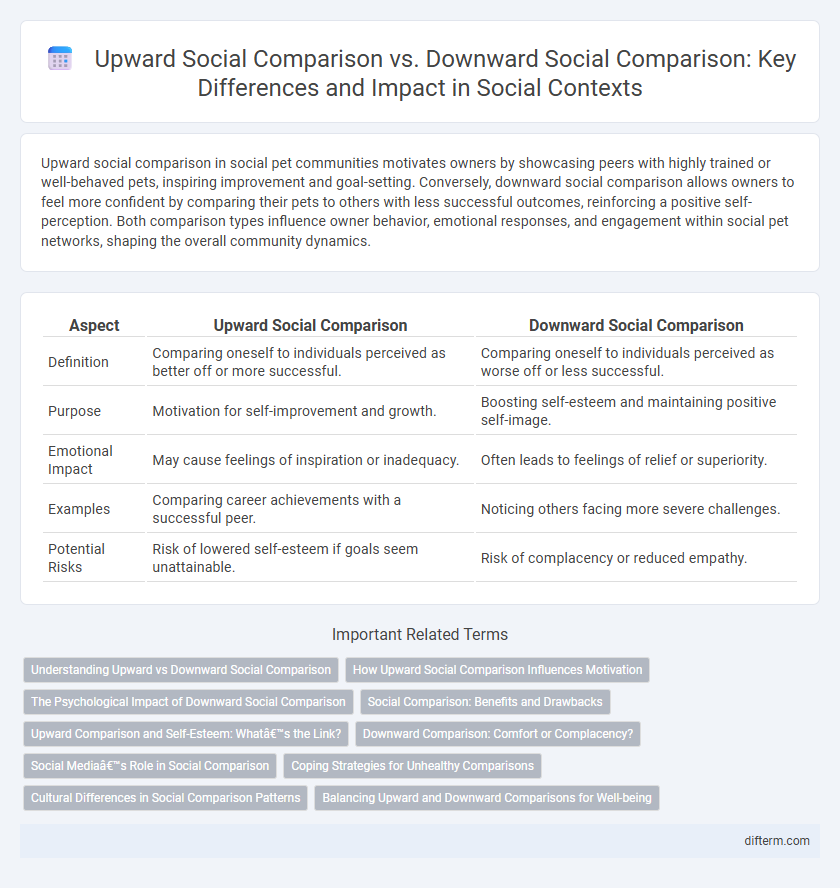Upward social comparison in social pet communities motivates owners by showcasing peers with highly trained or well-behaved pets, inspiring improvement and goal-setting. Conversely, downward social comparison allows owners to feel more confident by comparing their pets to others with less successful outcomes, reinforcing a positive self-perception. Both comparison types influence owner behavior, emotional responses, and engagement within social pet networks, shaping the overall community dynamics.
Table of Comparison
| Aspect | Upward Social Comparison | Downward Social Comparison |
|---|---|---|
| Definition | Comparing oneself to individuals perceived as better off or more successful. | Comparing oneself to individuals perceived as worse off or less successful. |
| Purpose | Motivation for self-improvement and growth. | Boosting self-esteem and maintaining positive self-image. |
| Emotional Impact | May cause feelings of inspiration or inadequacy. | Often leads to feelings of relief or superiority. |
| Examples | Comparing career achievements with a successful peer. | Noticing others facing more severe challenges. |
| Potential Risks | Risk of lowered self-esteem if goals seem unattainable. | Risk of complacency or reduced empathy. |
Understanding Upward vs Downward Social Comparison
Upward social comparison involves evaluating oneself against individuals perceived as superior in certain attributes, often driving motivation for self-improvement but also risking feelings of inadequacy. Downward social comparison occurs when individuals compare themselves to others deemed worse off, which can enhance self-esteem yet potentially foster complacency. Understanding these dynamics is crucial for managing psychological well-being and social behavior effectively.
How Upward Social Comparison Influences Motivation
Upward social comparison, where individuals compare themselves to those perceived as more successful or skilled, can enhance motivation by illuminating achievable goals and inspiring self-improvement. Exposure to higher standards often triggers increased effort and persistence as people strive to close the gap between their current state and the ideal. However, this comparison must be balanced to prevent feelings of inadequacy that could undermine motivational benefits.
The Psychological Impact of Downward Social Comparison
Downward social comparison often enhances self-esteem by allowing individuals to perceive themselves as better off than others, reducing feelings of anxiety and depression. This psychological strategy can serve as a buffer against negative emotions, promoting a more positive self-concept and increased resilience. However, reliance on downward comparison may also hinder personal growth by fostering complacency and limiting motivation for self-improvement.
Social Comparison: Benefits and Drawbacks
Upward social comparison, where individuals compare themselves to those perceived as better off, can foster motivation and self-improvement but may also lead to feelings of inadequacy and decreased self-esteem. Downward social comparison, comparing oneself to those worse off, often boosts self-confidence and emotional well-being but risks promoting complacency and a lack of personal growth. Balancing these comparison types is essential for maintaining mental health and fostering realistic self-assessment in social contexts.
Upward Comparison and Self-Esteem: What’s the Link?
Upward social comparison involves evaluating oneself against individuals perceived as superior in certain traits or achievements, often influencing self-esteem. Research indicates that upward comparisons can either motivate self-improvement or lead to feelings of inadequacy and decreased self-worth, depending on factors like self-efficacy and the perceived attainability of the comparison standard. Understanding the nuanced impact of upward comparison on self-esteem is critical for fostering positive social cognition and psychological well-being.
Downward Comparison: Comfort or Complacency?
Downward social comparison involves evaluating oneself against others perceived as worse off, which can provide comfort by boosting self-esteem and alleviating stress. This comparison may foster complacency by reducing motivation for self-improvement, as individuals feel secure in their relatively better position. Research in social psychology highlights that while downward comparison can enhance immediate emotional well-being, it may hinder long-term personal growth and goal pursuit.
Social Media’s Role in Social Comparison
Social media platforms amplify upward social comparison by exposing users to curated images of success, beauty, and achievement, often leading to decreased self-esteem and increased feelings of inadequacy. Conversely, downward social comparison on these platforms can provide temporary boosts in self-worth by highlighting others' perceived failures or struggles. Algorithms prioritize engaging content that intensifies these comparisons, making social media a powerful catalyst for both upward and downward social comparisons.
Coping Strategies for Unhealthy Comparisons
Unhealthy upward social comparisons often trigger feelings of inadequacy and low self-esteem, making cognitive reframing a crucial coping strategy to challenge negative thoughts. Engaging in downward social comparisons can boost self-worth but may foster complacency, so balanced mindfulness practices help maintain emotional equilibrium. Developing self-compassion and focusing on personal growth goals effectively mitigates the detrimental psychological effects associated with both types of social comparisons.
Cultural Differences in Social Comparison Patterns
Upward social comparison, common in individualistic cultures, often drives personal achievement and self-improvement by inspiring individuals to emulate higher-status or more successful peers. In contrast, collectivist cultures tend to engage more in downward social comparison, fostering group harmony and self-esteem by emphasizing relative social stability and avoiding conflict. These cultural differences shape how individuals perceive themselves and their social environment, influencing mental health and motivation across diverse societies.
Balancing Upward and Downward Comparisons for Well-being
Balancing upward and downward social comparisons plays a critical role in maintaining psychological well-being by fostering motivation without undermining self-esteem. Engaging in upward comparisons can inspire personal growth and goal-setting when approached constructively, while downward comparisons provide reassurance and boost confidence by highlighting relative advantages. Strategic integration of both comparison types helps individuals cultivate resilience and a realistic sense of self-worth, reducing negative emotions associated with social evaluation.
upward social comparison vs downward social comparison Infographic

 difterm.com
difterm.com